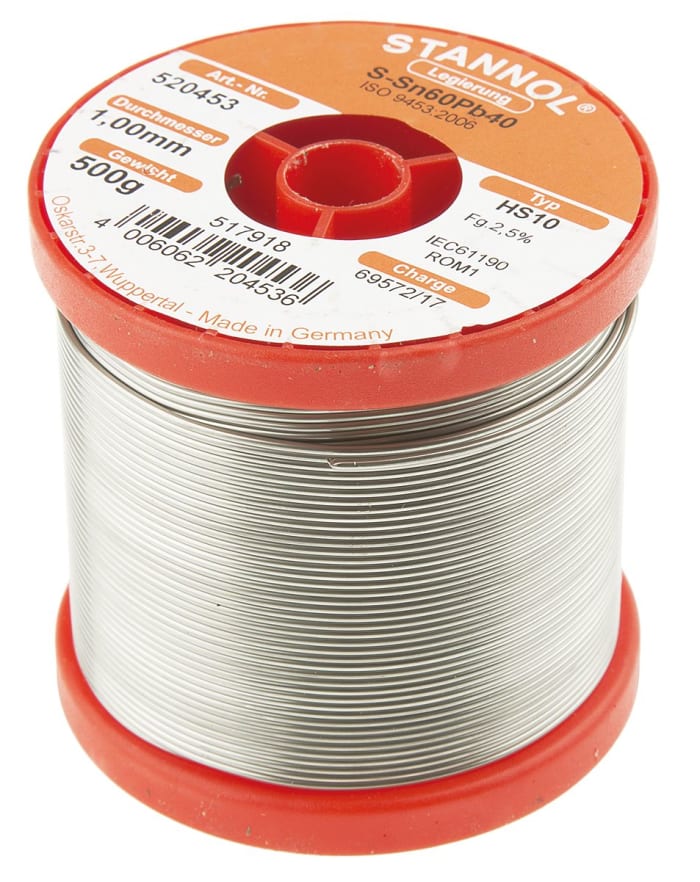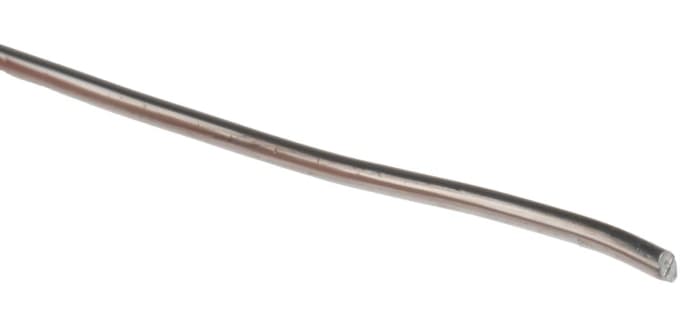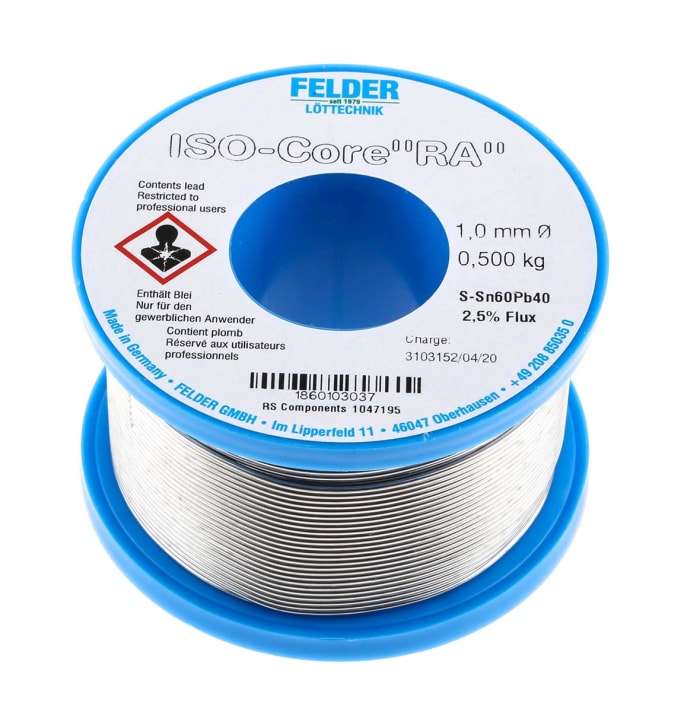Техническая документация
Характеристики
Brand
RS ProТип продукции
Свинцовый припой
Диаметр провода
1.01mm
Процент свинца
40%
Форма изделия
Проволока
Точка плавления
183°C
Процент олова
60%
Тип флюса
Rosin Based
Вес изделия
500g
Стандарты/одобрения
Нет
Страна происхождения
United States
Информация о товаре
RS PRO Tin/Lead Solder Wire
From the trusted RS PRO brand, this resin-based solder wire is a 60/40 tin/lead solder wire, with the solder flux formulated for wetting all common Printed Circuit Boards (PCBs) and components.
The residue left after soldering is clear and can be safely left on the PCB after soldering is complete.
Features and Benefits
• Versatile solder wire that is ideal for a varied range of soldering tasks
• Solder wire alloy contains 60% tin and 40% lead, conforming to J-STD 006
• Melting point is between 183-188°C
• 2.2% flux content
• Typical temperature for soldering iron tip is 320-360°C for use with this solder
Applications
Solder is used alongside soldering irons, particularly in securing electrical components to integrated circuit boards. The solder melts easily when heated, and cools quickly, meaning it can be moulded to secure components in place in solder joints. The quick setting nature of solder means it can also be used for light brazing.
Because of its relatively low melting point, solder can be reworked easily by heating it to melting point and using a solder sucker to remove it.
Solder is commonly used with SMD and through-hole components, with applications in repair, prototyping and production.
What are the differences between lead-free solder and leaded solder?
Lead-free solder is generally regarded as having a more positive environmental impact than leaded solder, and also as being safer for human use. However, lead-free solder also has potential production advantages. Lead-free solder can offer better lead spacing, which makes it more suitable for high-density components where pitches are tight. This means potentially better performance where space saving is a concern.
The advantages of lead solder are that it has a lower melting point, which is sometimes preferable for hand working components. Also, lower working temperatures reduces the risk of damage to components and circuit board.
Unlike lead-free solder, lead solder does not have a shelf-life and is less prone to losing quality after prolonged exposure to oxygen. However, many electronic application requirements exclude the use of lead solder, due to the toxicity of lead.
Why RS PRO?
RS PRO aims to be your go-to brand for reliability and value for money. We source great parts at great prices and test everything with our in-house experts to ensure the quality you need.
When it comes to tools, we know that versatility and dependability are what you need. As such, we stock a variety of mainstay and specialist tools to suit any application. Whether you're a professional electrician, technician, engineer or home inventor, RS PRO is here to support you.
Warning
Formulation contains lead which makes this solder wire unsuitable for soldering RoHS compliant products.
Standards
Conforms to J-STD 006
Flux classification per J-STD 004 is REL0 - leaves a highly reliable post soldering residue
Информация о наличии не успела загрузиться
P.O.A.
1
P.O.A.
Информация о наличии не успела загрузиться
1
Техническая документация
Характеристики
Brand
RS ProТип продукции
Свинцовый припой
Диаметр провода
1.01mm
Процент свинца
40%
Форма изделия
Проволока
Точка плавления
183°C
Процент олова
60%
Тип флюса
Rosin Based
Вес изделия
500g
Стандарты/одобрения
Нет
Страна происхождения
United States
Информация о товаре
RS PRO Tin/Lead Solder Wire
From the trusted RS PRO brand, this resin-based solder wire is a 60/40 tin/lead solder wire, with the solder flux formulated for wetting all common Printed Circuit Boards (PCBs) and components.
The residue left after soldering is clear and can be safely left on the PCB after soldering is complete.
Features and Benefits
• Versatile solder wire that is ideal for a varied range of soldering tasks
• Solder wire alloy contains 60% tin and 40% lead, conforming to J-STD 006
• Melting point is between 183-188°C
• 2.2% flux content
• Typical temperature for soldering iron tip is 320-360°C for use with this solder
Applications
Solder is used alongside soldering irons, particularly in securing electrical components to integrated circuit boards. The solder melts easily when heated, and cools quickly, meaning it can be moulded to secure components in place in solder joints. The quick setting nature of solder means it can also be used for light brazing.
Because of its relatively low melting point, solder can be reworked easily by heating it to melting point and using a solder sucker to remove it.
Solder is commonly used with SMD and through-hole components, with applications in repair, prototyping and production.
What are the differences between lead-free solder and leaded solder?
Lead-free solder is generally regarded as having a more positive environmental impact than leaded solder, and also as being safer for human use. However, lead-free solder also has potential production advantages. Lead-free solder can offer better lead spacing, which makes it more suitable for high-density components where pitches are tight. This means potentially better performance where space saving is a concern.
The advantages of lead solder are that it has a lower melting point, which is sometimes preferable for hand working components. Also, lower working temperatures reduces the risk of damage to components and circuit board.
Unlike lead-free solder, lead solder does not have a shelf-life and is less prone to losing quality after prolonged exposure to oxygen. However, many electronic application requirements exclude the use of lead solder, due to the toxicity of lead.
Why RS PRO?
RS PRO aims to be your go-to brand for reliability and value for money. We source great parts at great prices and test everything with our in-house experts to ensure the quality you need.
When it comes to tools, we know that versatility and dependability are what you need. As such, we stock a variety of mainstay and specialist tools to suit any application. Whether you're a professional electrician, technician, engineer or home inventor, RS PRO is here to support you.
Warning
Formulation contains lead which makes this solder wire unsuitable for soldering RoHS compliant products.
Standards
Conforms to J-STD 006
Flux classification per J-STD 004 is REL0 - leaves a highly reliable post soldering residue




